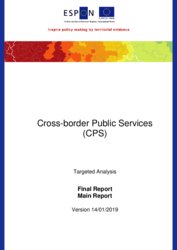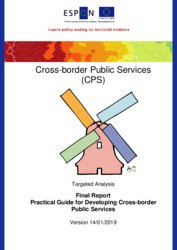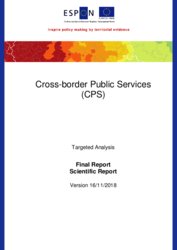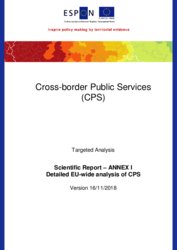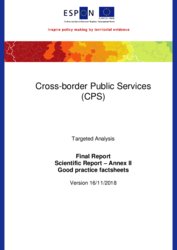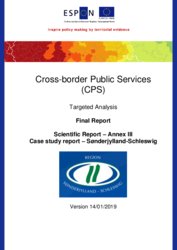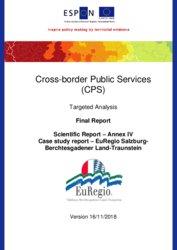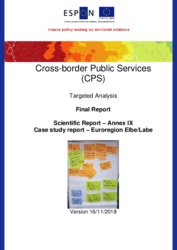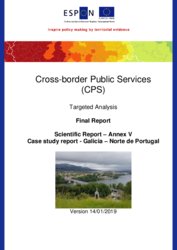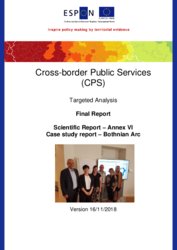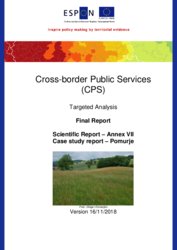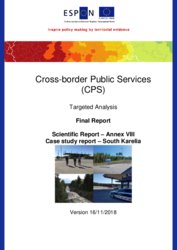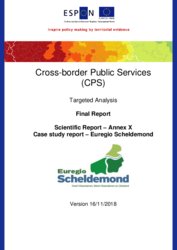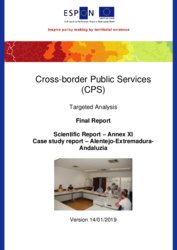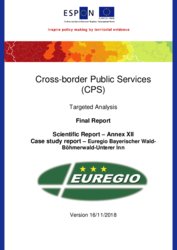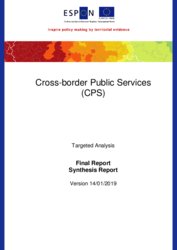CPS - Cross-border Public Services
Theme: cross-border cooperation, services of general interest, territories with geographic specificities, cross-border metropolitan areas, border regions
Scope
The targeted Cross-border Public Services (CPS) analysis aimed to improve delivery practices of CPS in European border-regions and to increase awareness about the added value of CPS provision. The project produced a first comprehensive overview of CPS across Europe. This overview allowed to explore territorial patterns of CPS provision and to highlight the main features of good practice examples. In addition, in ten case study
The main outcomes of this project address various stakeholders. At European and national levels, territorial evidence and findings on key challenges in implementing CPS encourage measures to support CPS development through top-down initiatives. Similarly, Interreg programme authorities are encouraged to promote CPS development in their programmes. Stakeholders in border regions may use project outcomes as
Policy questions
- Where do cross-border public services exist along EU borders?
- Which services are available in the cross-border study areas covered by CPS and which services are currently missing, regarding stakeholders objectives and needs (i.e. in which specific policy fields)?
- What are potential blocking factors for developing cross-border services in the study areas covered by CPS (i.e. existing border obstacles)?
- What are the development potentials and future needs in the study areas covered by CPS for setting up cross-border public services, and how can these potentials best be exploited?
- What are the main policy recommendations for improving cross-border public service provision, both in the study areas covered by CPS but also generally for cross-border regions throughout the EU?
Key findings
579 CPS have been identified along European borders. They are located at various borders and address several policy fields. Most CPS have been identified along the borders of the Benelux countries, France, Germany, and the Nordic countries. Territorial characteristics of these border regions differ considerably. Thus, CPS can address local development needs in many ways that do not make CPS provision more likely for certain types of territories. For example, CPS contribute to reducing negative border effects, support cross-border flows of people, or contribute to raising awareness of cross-border possibilities.
Currently, most identified CPS
Typical challenges for CPS development do not only hint at
Stakeholders
- Region Sønderjylland – Schleswig Joint Secretariat & Infocenter (lead stakeholder)
- EuRegio Salzburg Berchtesgadener Land Traunstein, Germany
- Euregio Bayerischer Wald – Böhmerwald – Unterer Inn e.V., Germany
- Galicia North Portugal EGTC, Spain
- Bothnian Arc, Sweden
- Development Centre Murska Sobota, Slovenia
- Regional Council of South Karelia
- Kommunalgemeinschaft Euroregion Oberes Elbtal/Osterzgebirge e.V., Germany
- Province of East Flanders on behalf of Euregion Scheldemond, Belgium
- Coordination Commission for Regional Development for Alentejo, Portugal
- Euregio Bayerischer Wald/ Böhmerwald – Regionalmanagement Mühlviertel, Austria
The Association of European Border Regions (AEBR) has been chosen to operate as helpdesk to assists the service provider in all its tasks, supports stakeholders and carries out specific activities on behalf of all partners.
Contractors
- Spatial Foresight, LU (lead contractor)
- Eureconsult S.A., LU
- TCP International GmbH, DE
- IPoP-Institute for Spatial Policies, SI
- IGOT - Lisbon University, PT
- Nordregio, International Research Center, SE
Budget: € 249 778.00
Lifetime: November 2017 – November 2018
Deliveries
- Inception delivery, 16 January 2018
- Interim delivery, 16 April 2018
- Draft Final delivery, 31 August 2018
- Final delivery, 16 November 2018
Contact: Nicolas Rossignol (Project Expert) nicolas.rossignol@espon.eu, Marta Roca (Financial Expert) marta.roca@espon.eu
